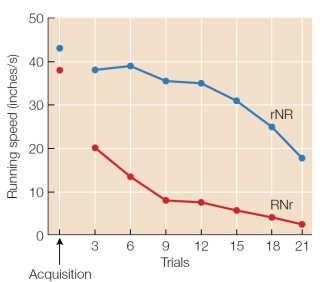Exam 9: The Motivation of Instrumental Action
Exam 1: Learning Theory: What It Is and How It Got This Way96 Questions
Exam 2: Learning and Adaptation97 Questions
Exam 3: The Nuts and Bolts of Classical Conditioning102 Questions
Exam 4: Theories of Conditioning118 Questions
Exam 5: What Ever Happened to Behavior Anyway97 Questions
Exam 6: Are the Laws of Conditioning General94 Questions
Exam 7: Behavior and Its Consequences105 Questions
Exam 8: How Stimuli Guide Instrumental Action109 Questions
Exam 9: The Motivation of Instrumental Action102 Questions
Exam 10: A Synthetic Perspective on Instrumental Action109 Questions
Select questions type
Which behavior is based on an acquired motivation?
Free
(Multiple Choice)
4.8/5  (42)
(42)
Correct Answer:
B
Learning theorists assume that behavior is inherently goal-oriented because behavior is
Free
(Multiple Choice)
4.7/5  (36)
(36)
Correct Answer:
A
According to Hull, _______ is influenced by _______.
Free
(Multiple Choice)
4.8/5  (31)
(31)
Correct Answer:
B
In the experiment whose results are shown below, animals received rewards for running in a runway. In three-trial sequences they received a small reward, no reward, and a big reward (rNR), or they received the same trials with the two rewards switched (RNr). As shown in the figure, the rNR condition showed a greater PREE effect (was more resistant to extinction). This result supports sequential theory because in the rNR condition a big reward is associated with a preceding N trial, whereas a small reward is associated with the preceding N trial in the RNr condition. Evaluate whether this result can be explained by the frustration hypothesis.

(Essay)
5.0/5  (29)
(29)
According to Hull's formulation of factors affecting performance,
(Multiple Choice)
4.9/5  (33)
(33)
A motivational perspective assumes that behavior will persist when
(Multiple Choice)
5.0/5  (34)
(34)
A "revolution" occurred in animal learning in the late 1960s as researchers began to emphasize _______ factors in the regulation of animal learning phenomena.
(Multiple Choice)
5.0/5  (45)
(45)
Rewards are most likely to have a negative effect on performance if subjects receive
(Multiple Choice)
4.8/5  (37)
(37)
Sydney announces to her class that bonus points will be available for written thought papers on a topic. She expects performance on tests to increase. Which statement is true?
(Multiple Choice)
4.9/5  (25)
(25)
Over time, a nurse comes to enjoy the ordinarily nerve-wracking task of taking blood from patients. This enjoyment would be predicted by
(Multiple Choice)
4.9/5  (37)
(37)
If frustration is a function of the difference between expected reward and what was obtained,
(Multiple Choice)
4.8/5  (36)
(36)
Concurrent measurement studies have tended to find that classically conditioned responses
(Multiple Choice)
4.8/5  (30)
(30)
Pavlovian-instrumental transfer experiments show us that appetitive and aversive motivations are
(Multiple Choice)
4.7/5  (37)
(37)
Incentive contrast effects tell us that the value of an outcome is
(Multiple Choice)
4.9/5  (39)
(39)
Showing 1 - 20 of 102
Filters
- Essay(0)
- Multiple Choice(0)
- Short Answer(0)
- True False(0)
- Matching(0)